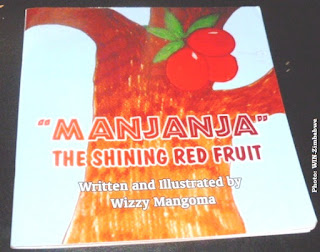Title: Manjanja
–The Shining Red Fruit
Written and Illustrated by: Wizzy Mangoma
Publisher: PublishAmerica, USA
Year: 2011
ISBN: 978-1-4626-0475-3
Reviewer: Beaven
Tapureta
Stories do more than just entertain; they
also teach a lesson and exhibit cultural values of a particular people.
Manjanja –The
Shining Red Fruit
is written as a children’s tale but it appeals to adults as well.
From long ago, people have acted without thinking about the consequences and this, for children, is a vice that they have always been taught by parents to avoid. Acting without thinking is exactly what Kanda, the main character in this tale, does.
Kanda and his family live in an African
village. As the story unfolds, one is made to understand the cultural values of
the African people which include hard work, sharing, and forgiveness. The people in the village subsist on
growing crops and keeping animals and are happy as the seasons are generous.
Kanda and his family, being owners of one
of the biggest pieces of land in the village, are rich and hard workers. The
villagers honor them but there is some behaviour unknown to everyone, including
his family, which Kanda has.
The writer does well with her simple but
captivating language when describing human behaviour. Kanda receives reverence from everyone
but he takes it for granted. Being rich, he foresees no trouble in the future.
However, drought strikes the village.
Hard times replace good times. One would predict Kanda will give up work in his
field and follow others walking miles away to look for food. But he and his
family carry on going to the fields to take care of the little crops they had
planted.
The author uses the journeys to the field to reveal what
Kanda is really made of. On one of their journey to the field, Kanda becomes
weak and thirsty. It happens also that his wife has forgotten to carry water on
this journey.
Children will like this part because it
carries a supernatural character called Manjanja, which is a talking tree. The interplay of reality and ‘super-nature’ brings forth entertaining episodes
that lead to the revelation of Kanda’s character and how his family and the
village forgive him.
Kanda does not tell anyone, including his
family, about Manjanja-The Shining Red Fruit, which he discovers when he
decides to go to the nearby river to get water while his family continues with
the journey to their field.
It becomes a habit that each time they come
to the spot near the tree on their way to the field, Kanda excuses himself from
his family and goes to the tree to sing and the tree would throw down big red
fruits which he gormandized alone.
In this time of hardship, Kanda’s selfish
behaviour is exposed. While others eat little or no food at all because of the
drought, he secretly feeds on fruits and no longer eats at home. His family and
the villagers become suspicious of his avoidance of food and they begin to think
he is sick.
Nothing bad lasts forever as one day his
wife asks her ten-year old son, Saka, to secretly follow his father into the
bush. Saka is shocked to see his father singing and dancing around a tree, gathering and
eating fruits dropping from the tree.
Saka must have been a genius, for he learns his
father’s song quickly. Children love songs in tales. The song is the apex of
the story, from here the story approaches dénouement. He tells his mother about the
tree, the falling fruits and recites the song very well. The tree is no longer
a secret. His mother, Seni, hatches a plan which carries the moral of the
story.
While Kanda takes an afternoon sleep in
the field, his family, led by Saka, visits the tree. They sing the song around
the tree and surprisingly fruits start falling from it. They fill baskets and
Seni tells her children to hide them at home where Kanda would not see them.
In the song there are these words,
“…If I show them the fruits, shine, shine/
They will take
them all away from me, shine, shine…”
This song was taught to Kanda by the tree
and one then concludes the tree was predicting its future, for when Kanda’s
family sing around it for a long time, all its fruits fall down. They then hang
stones in the tree.
Selfishness is punished when the next day
Kanda comes to his tree and sings and instead of receiving fruits, he is hit by
huge stones falling from the tree. If one carries a secret, it is painful to
then secretly bear the effects of the secret when it turns sour.
One of the African values upheld in the
story of Manjanja is forgiveness. Instead of shouting down on Kanda for being
selfish, his wife and children and the villagers forgive him and he learns about
sharing and giving.
The author, Wizzy Mangoma, published a
motivational poetry collection titled Moment
Treasures (2010, Createspace), which is available on Amazon.com. In 2011,
she co-authored the book As They Find A
Way: A Journey of Various Creative Zimbabwean Women with Zimbabwean model
Teurai Chanakira. Born in Zimbabwe,
Wizzy Mangoma is a writer, model, designer, motivational speaker, spoken word
artist, poet, dancer, and story-teller. She has traveled and performed in
various groups and projects ranging from United African Ballet of Denmark to
television series. She has worked with children from all backgrounds including
children with special needs. She also worked with charity organizations
coordinating various campaigns. She returned to her homeland Zimbabwe this year
from Dallas, Texas, where she was based.


No comments:
Post a Comment